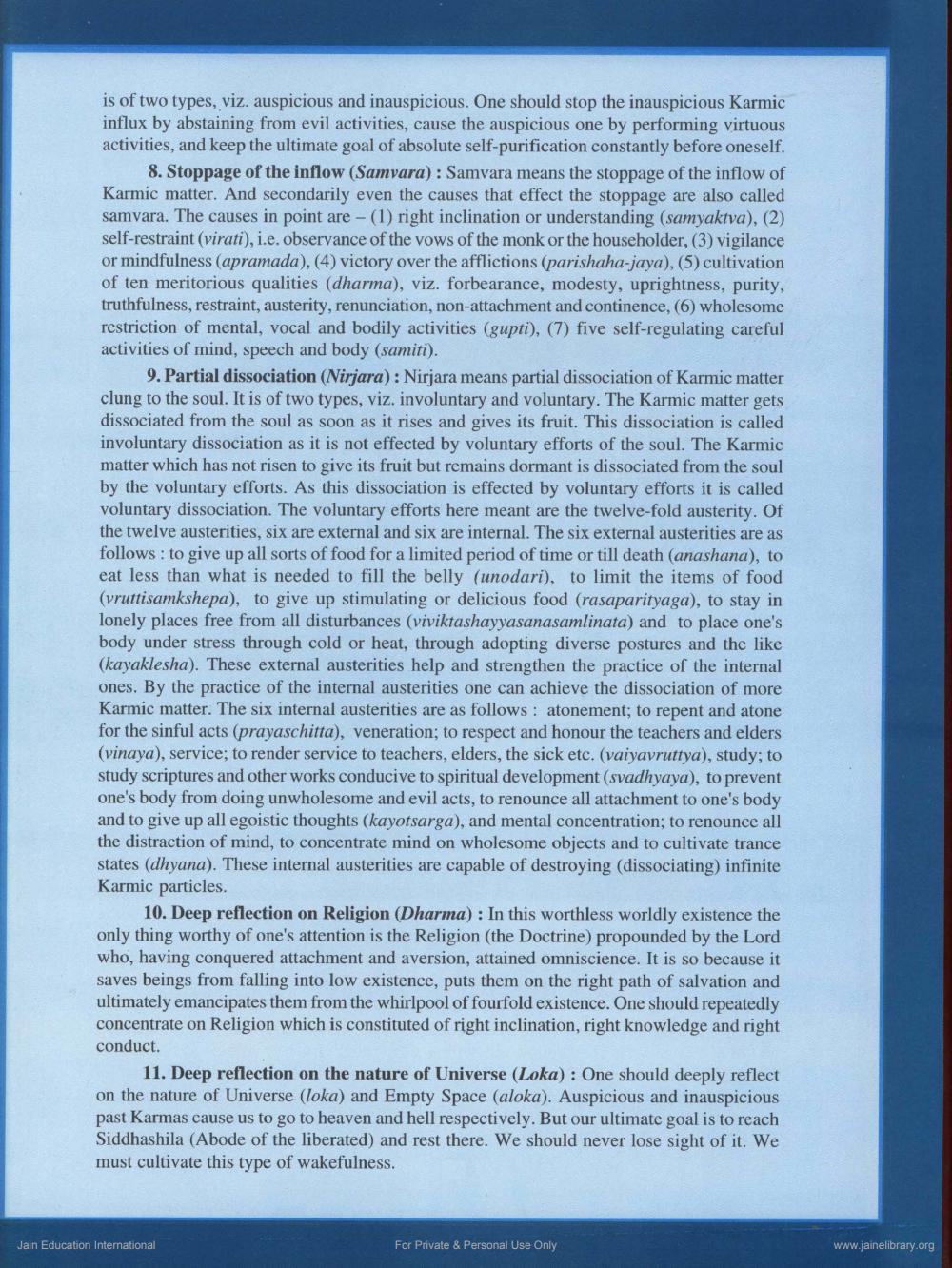________________
is of two types, viz. auspicious and inauspicious. One should stop the inauspicious Karmic influx by abstaining from evil activities, cause the auspicious one by performing virtuous activities, and keep the ultimate goal of absolute self-purification constantly before oneself
8. Stoppage of the inflow (Samvara) : Samvara means the stoppage of the inflow of Karmic matter. And secondarily even the causes that effect the stoppage are also called samvara. The causes in point are - (1) right inclination or understanding (samyaktva), (2) self-restraint (virati), i.e. observance of the vows of the monk or the householder, (3) vigilance or mindfulness (apramada), (4) victory over the afflictions (parishaha-jaya), (5) cultivation of ten meritorious qualities (dharma), viz. forbearance, modesty, uprightness, purity, truthfulness, restraint, austerity, renunciation, non-attachment and continence, (6) wholesome restriction of mental, vocal and bodily activities (gupti), (7) five self-regulating careful activities of mind, speech and body (samiti).
9. Partial dissociation (Nirjara): Nirjara means partial dissociation of Karmic matter clung to the soul. It is of two types, viz. involuntary and voluntary. The Karmic matter gets dissociated from the soul as soon as it rises and gives its fruit. This dissociation is called involuntary dissociation as it is not effected by voluntary efforts of the soul. The Karmic matter which has not risen to give its fruit but remains dormant is dissociated from the soul by the voluntary efforts. As this dissociation is effected by voluntary efforts it is called voluntary dissociation. The voluntary efforts here meant are the twelve-fold austerity. Of the twelve austerities, six are external and six are internal. The six external austerities are as follows: to give up all sorts of food for a limited period of time or till death (anashana), to eat less than what is needed to fill the belly (unodari), to limit the items of food (vruttisamkshepa), to give up stimulating or delicious food (rasaparityaga), to stay in lonely places free from all disturbances (viviktashayyasanasamlinata) and to place one's body under stress through cold or heat, through adopting diverse postures and the like (kayaklesha). These external austerities help and strengthen the practice of the internal ones. By the practice of the internal austerities one can achieve the dissociation of more Karmic matter. The six internal austerities are as follows: atonement; to repent and atone for the sinful acts (prayaschitta), veneration; to respect and honour the teachers and elders (vinaya), service; to render service to teachers, elders, the sick etc. (vaiyavruttya), study, to study scriptures and other works conducive to spiritual development (svadhyaya), to prevent one's body from doing unwholesome and evil acts, to renounce all attachment to one's body and to give up all egoistic thoughts (kayotsarga), and mental concentration; to renounce all the distraction of mind, to concentrate mind on wholesome objects and to cultivate trance states (dhyana). These internal austerities are capable of destroying (dissociating) infinite Karmic particles.
10. Deep reflection on Religion (Dharma): In this worthless worldly existence the only thing worthy of one's attention is the Religion (the Doctrine) propounded by the Lord who, having conquered attachment and aversion, attained omniscience. It is so because it saves beings from falling into low existence, puts them on the right path of salvation and ultimately emancipates them from the whirlpool of fourfold existence. One should repeatedly concentrate on Religion which is constituted of right inclination, right knowledge and right conduct
11. Deep reflection on the nature of Universe (Loka) : One should deeply reflect on the nature of Universe (loka) and Empty Space (aloka). Auspicious and inauspicious past Karmas cause us to go to heaven and hell respectively. But our ultimate goal is to reach Siddhashila (Abode of the liberated) and rest there. We should never lose sight of it. We must cultivate this type of wakefulness.
Jain Education International
For Private & Personal Use Only
www.jainelibrary.org




